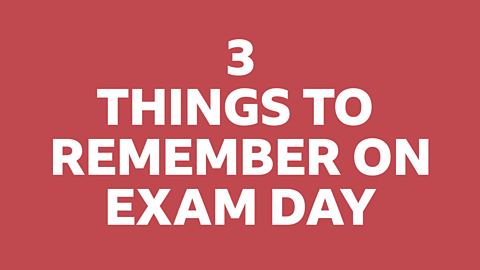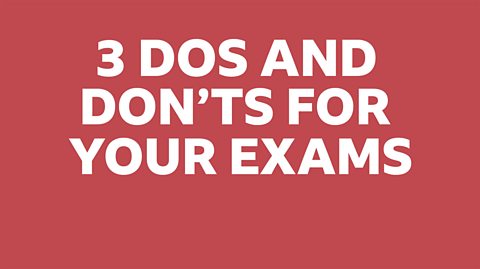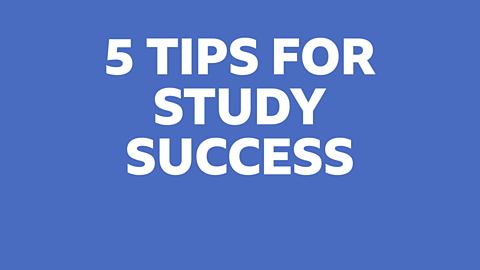Past papers are THE BEST. If you don't believe us, then ask our exam veteran Amiga – she loves them! We often get told to look to the future, but past papers are definitely one time when you can look in the rear view mirror to help improve your prospects going forwards.
Watch the video below to find out what our exam veterans have to say about all things past papers and to discover the benefits of using them. The tips are all re-capped below!
Daachi: Okay, I've got some expert exam tips on using past papers for your revision.
Amy: Bring it on.
Amiga: Past papers are the best. They are the one.
Dylan: Here's the first tip. Visit your exam board's website to download past papers.
Amiga: I used to run away from past papers, especially maths. I still do not like maths at all. However, I decided to do a past paper and it really did help a lot. I got my head around past papers with the questions and the style of the questions, and if you are unsure where to find the past papers, you can ask your teachers for copies.
Dylan: Past papers upped my revision game. They helped me become familiar with the types of questions and what the questions were actually asking me to do. It did feel a bit tedious at the beginning. There was past paper then another past paper, then another past paper. But you really do want to take advantage of them. They are amazing.
Amiga: Good to meet another fan.
Amy: Okay, next tip.
Daachi: Check with your teacher if any changes have been made to the specification.
Amy: A past paper may have topics on it that are no longer covered on the exam. We worked with our teachers to make sure we knew if there were any changes from past years. They helped us to focus on the right topics for this year's exam.
Amiga: Your teachers will be the most up to date as they can be with exam content and will make sure you know what topics are covered. So hopefully you won't get too many unexpected surprises.
Daachi: Teachers are heroes.
Amiga: Next tip, please.
Dylan: Once you've revised the subject test your knowledge and mark yourself. The exam board websites have the answers to the past papers too, so you can mark yourself. I would always get the marks scheme and answers after I'd done the paper because I couldn't trust myself to not look. You could ask your teacher if they're happy to mark past papers and run revision sessions that take you through the process too.
Amy: I do the entire paper first to get used to it. Then I'd look at the answers to the questions, compare my answers, and see how I could improve on them. With the more difficult subjects like science I would sometimes go back to the teacher and say, can you explain this? It took lots of time and attention, but it was worth it.
Daachi: You can even get mark schemes for stuff like extended responses in English. Teachers often have essays that achieved full marks that you can review. So I would look at a past paper and I'd write out what I would say. Then I'd look at a response that got full marks. I'd look at the type of language used in the question then the type of language used in the answer. Think about the keywords that were used and why the answer was written like that. It really helped me to develop how I would answer them.
Dylan: Next tip, please.
Amiga: Your teacher will be able to tell you what the exam structure will be.
Amy: When you do past papers you get a good sense of what the structure is and how the questions work. Look at each type of question. Learn what that question is asking you to do and practice, practice, practice. Don't practice until you get it right. Practice until you can't get it wrong.
Amy: Okay, last one.
Daachi: Use past papers to practice how much time you allow for each type of question.
Amy: From multiple choice, right through to extended responses. Past papers really helped me understand how much time I had in an exam.It's this type of question I need to remember to move on after this amount of minutes. A good rule of thumb is to divide the time you have by how many marks are available. So a 60 mark paper in one hour is one mark a minute.
Daachi: But don't forget to allow for reading time at the start.
Amy: Yes, of course.
Amiga: So download past papers. But really important to check with your teacher if the content or format has changed. Know the format for each exam and practice how much time you have for different questions and just do past papers everyone. It's one of the top, top things.

Advice about using past papers
Although past papers are likely to contain different questions than the ones you'll study on your actual exam, you can still learn a lot from them. Check out our tips below for how to make the most of your past paper.
Download past papers You'll be able to find and download past papers on your exam board's website. Doing lots of past papers will help you become familiar with the type and style of question that may be asked on your exam. If you're unsure where to get past papers from, ask a teacher.
Check with your teacher about specification changes While past papers can be a mine of useful information, some of the it may no longer be relevant. Work with your teacher to make sure you know if there will be any changes from previous year's exams so you know what to focus on.
Test yourself and check your answers You can find the mark scheme and answers to past papers on the exam board website. Once you've done your paper, you can go back through and see where you did well and where you need to improve. You could also talk to your teacher and see whether they're happy to mark your paper or run revision sessions. This can be especially helpful for subjects with extended answers like English.
Practice, practice, practice Look at each question in the past paper and think about what it's asking you to do and which keywords are used and then think about how you should answer it. Become familiar with everything on the paper and practise as many past papers as you can.
Time management Try to do your past papers in exam-like conditions and stick to the time-limit you set – this will help when it comes to the real thing. A good rule of thumb is to divide the time you have by the number of marks available, so a sixty mark paper over an hour is one mark per minute, but don't forget to allow for time to read the instructions at the start of the paper and re-read your answers at the end!

If you want some more useful exam tips and guidance, then we've got loads of amazing advice to help guide you through exam season on the pages below, what are you waiting for? Give them a tap!

If you need support
You should always tell someone about the things you’re worried about. You can tell a friend, parent, guardian, teacher, or another trusted adult. If you're struggling with your mental health, going to your GP can be a good place to start to find help. Your GP can let you know what support is available to you, suggest different types of treatment and offer regular check-ups to see how you’re doing.
If you’re in need of in-the-moment support you can contact Childline, where you can speak to a counsellor. Their lines are open 24 hours a day, 7 days a week.
There are more links to helpful organisations on BBC Action Line.

3 practical things to remember on exam day
On the run-up to exams, we can get so worked up with revision that we can sometimes forget a few simple, but quite important, practical things about the big day. Our exam veterans give us their top tips.

3 do’s and don’ts for your exams
We've asked our exam veterans for their top do's and don'ts to help you get through your exams.

5 tips for study success
Hold on to your hats as we're about to give you a whirlwind guide on how to study for success.
